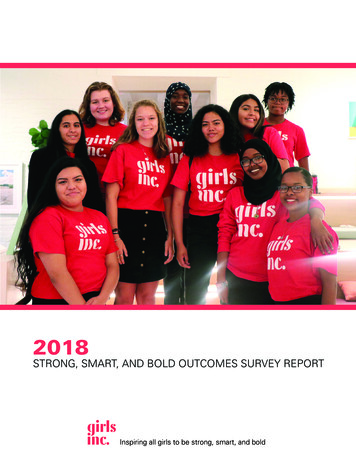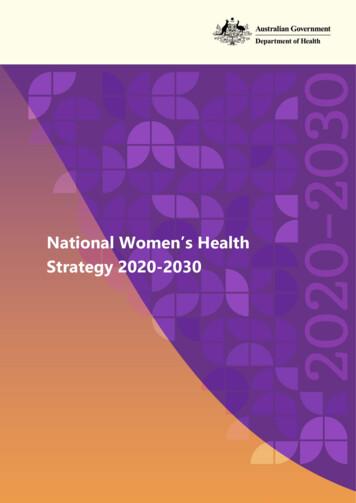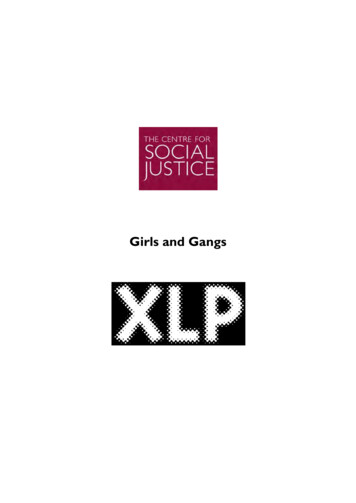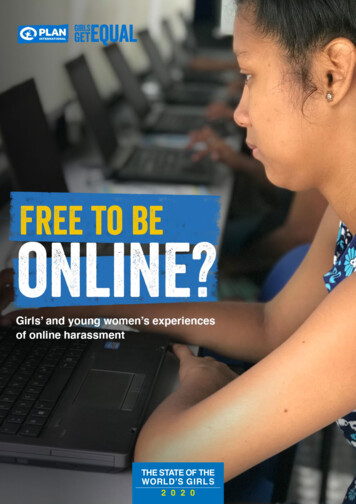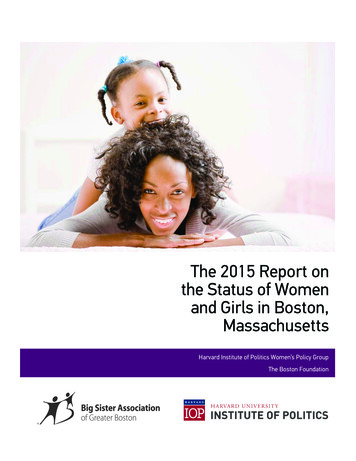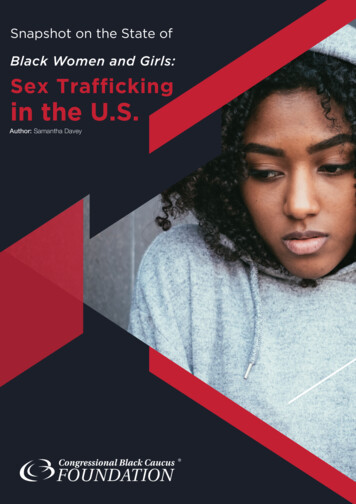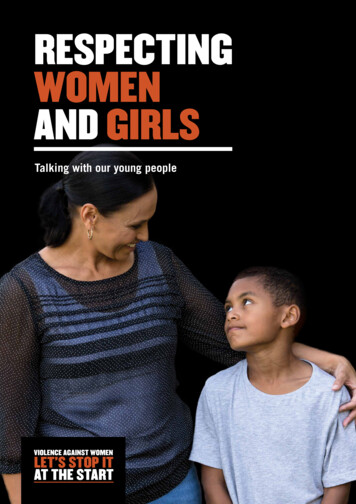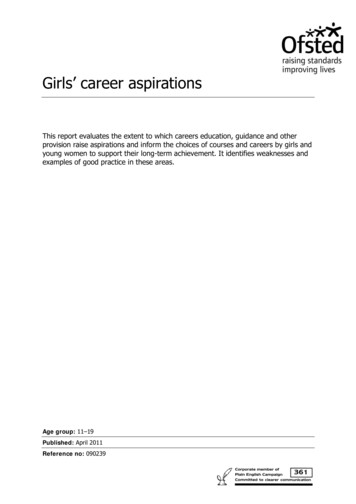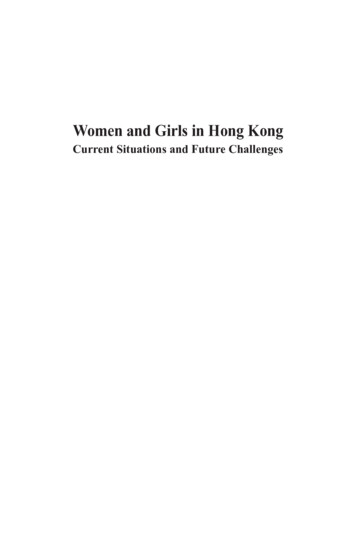
Transcription
Women and Girls in Hong KongCurrent Situations and Future Challenges
Women and Girls in Hong KongCurrent Situations and Future ChallengesEdited bySusanne Y. P. ChoiFanny M. CheungHong Kong Institute of Asia-Pacific StudiesThe Chinese University of Hong Kong2012
Research Monograph No. 95This study was commissioned by, and developed in partnership with,The Women’s Foundation. The Women’s Foundation 2012All Rights Reserved. No part of this work may be reproduced ortransmitted in any form or by any means, electronic or mechanical,including photocopy and recording, or by any information storage orretrieval system without permission in writing from the The Women’sFoundation.ISBN 978-962-441-595-7Published byHong Kong Institute of Asia-Pacific StudiesThe Chinese University of Hong KongShatin, New TerritoriesHong KongPrinted in Hong Kong by Super Sharp Production Company
ContentsForeword by The Women’s FoundationviiContributorsxi1. Introduction1Susanne Y. P. Choi and Fanny M. Cheung2. Women and Education21Grace C. L. Mak3. Women and the Economy43Hang-yue Ngo4. Women and Poverty69Hung Wong and Man-ying Fong5. Women and Health99Suzanne C. Ho and Carmen Wong6. Intimate Partner Violence Against Women135Jenny T. Y. Chiu and Susanne Y. P. Choi7. Women and FamilyKwok-fai Ting and Ching-man Lam169
viWomen and Girls in Hong Kong8. Women in Power and Decision Making191Fanny M. Cheung and Eliza W. Y. Lee9. Gender and the Media223Anthony Y. H. Fung and Mike Yao10. Migrant Women and Ethnic Minority Women245Siumi Maria Tam and Yu-ying Tong11. Victimization and Risk Behaviours among Girl-children265King-wa Lee, Nicole W. T. Cheung and Hua Zhong12. Institutional Mechanisms for the Advancement of WomenAmy Barrow295
ContributorsAmy BARROW is an Assistant Professor and a member of theCentre for Rights and Justice in the Faculty of Law of The ChineseUniversity of Hong Kong. Her research primarily focuses on theintersection between gender equality and public international law inpost-conflict societies as well as the role of institutional mechanismsfor the advancement of women. She is a member of the Women’sInternational League for Peace and Freedom, an internationalnon-governmental organization recognized by the United NationsEconomic and Social Council, which works for peace, disarmamentand gender equality. She is also a member of the Centre for CivilSociety Studies and the Executive Committee member of the GenderResearch Centre at the Hong Kong Institute of Asia-Pacific Studies.Fanny M. CHEUNG is the Department Chair and Professor ofPsychology, and the Director of the Hong Kong Institute of AsiaPacific Studies at The Chinese University of Hong Kong. In 1985,she founded the first gender research centre in Hong Kong, nowhoused under the Hong Kong Institute of Asia-Pacific Studies, andserved as the Centre’s Director until 2010. Her research and over 180academic publications are on the subjects of gender equality, womenleadership, the work-family interface, as well as cross-culturalpersonality assessments and psychopathology. She was the foundingChairperson of the Equal Opportunities Commission in Hong Kongfrom 1996 to 1999.
xiiWomen and Girls in Hong KongNicole W. T. CHEUNG is an Assistant Professor in the Departmentof Sociology of The Chinese University of Hong Kong. Her researchfocuses on the sociology of deviance, delinquency, drug abuse, andgambling addiction. She is currently the principal investigator oftwo projects on adolescent gambling and gender differences in thegambling behaviours of married couples in Hong Kong. Her recentpublications have appeared in Sociological Perspectives, SubstanceUse and Misuse, and Journal of Youth and Adolescence. She is alsoa member of the Sub-committee on Treatment and Rehabilitation ofthe Action Committee Against Narcotics, and a member of the HongKong government’s Commission on Youth.Jenny T. Y. CHIU is an MPhil student in the Department of Sociologyat The Chinese University of Hong Kong. She is currently workingon her thesis on cross-border marriage and domestic violence againstimmigrant women. Her honours project on Chinese new immigrantsin Hong Kong was awarded the third prize in the 11th NationalChallenge Cup Contest. Since 2008, she has been a voluntary memberof the Association Concerning Sexual Violence Against Women. Herresearch interests include violence against women, gender and family,intergenerational relations, and migration.Susanne Y. P. CHOI is an Associate Professor and the Director ofthe Pearl River Delta Social Research Centre at the Department ofSociology of The Chinese University of Hong Kong. She is also theDirector of the Gender Research Centre at the Hong Kong Instituteof Asia-Pacific Studies. Her research interests include gender, family,health, migration, and transitional justice. Her articles have beenpublished in the American Journal of Sociology; Journal of Marriageand Family; Sociology of Health and Illness; The China Quarterly;Political Psychology; Social Science and Medicine; AIDS Care;Journal of Conflict Resolution; International Migration Review;Human Rights Quarterly; Sexually Transmitted Diseases; Journalof Interpersonal Violence; Culture, Health and Sexuality; and theAmerican Journal of Gastroenterology.
ContributorsxiiiMan-ying FONG has been the Head of the Division of Humanitiesand Social Sciences at the Hong Kong College of Technology sinceSeptember 2009. She was a member of the Women’s Commissionin Hong Kong from 2006 until January 2012. She has activelyparticipated in women’s groups and is the current Vice Chairpersonof the HER Fund, which advances women’s and girls’ rights throughfundraising, grant-making and philanthropic education.Anthony Y. H. FUNG is a Professor and the Director of the School ofJournalism and Communication at The Chinese University of HongKong. He received his PhD from the School of Journalism and MassCommunication at the University of Minnesota. His research interestsand teaching focus on popular culture and cultural studies, gender andyouth identity, cultural industries and policy, the political economy ofcommunication and new media studies. He is the author and editorof more than 10 books in Chinese and English. His recent books areGlobal Capital, Local Culture: Transnational Media Corporations inChina (2008), Riding a Melodic Tide: The Development of Cantopopin Hong Kong (2009) (in Chinese), Policies for the SustainableDevelopment of the Hong Kong Film Industry (2010), ImaginingChinese Communication (2012) (in Chinese), Melodic Memories: TheHistorical Development of the Music Industry in Hong Kong (2012)(in Chinese), and Asian Popular Culture: The Global (Dis)continuity(forthcoming).Suzanne C. HO is Emeritus Professor of Public Health and PrimaryCare, and the founding Director of the Centre of Research andPromotion of Women’s Health of the Faculty of Medicine at TheChinese University of Hong Kong. She is also the founding Directorof the Postgraduate Programmes in Epidemiology and Biostatistics,and a founding member and the Vice-President of Women’s Initiativesfor Ageing Successfully Hong Kong. Her major research interestsare in women’s health, particularly cardiovascular disease risks,osteoporosis, and breast cancer in women, nutritional epidemiology,and ageing. She has obtained many competitive grants from thegovernment as well as international research funds for studies in the
xivWomen and Girls in Hong Kongabove-mentioned areas. Her publications total 19 books and bookchapters, and over 200 articles in refereed journals.Ching-man LAM is an Associate Professor in the Department ofSocial Work at The Chinese University of Hong Kong. She obtainedher MSW from McGill University (Canada), and her PhD fromWilfrid Laurier University (Canada). Her research interests relate toclinical practice, marital and family therapy, social work education,school social work, and adolescence and family studies. She hasserved as a member of the Women’s Commission, a member of theboard of various social welfare agencies, an advisor to various serviceprojects, and as a member of the board of directors of a secondaryschool.Eliza W. Y. LEE is an Associate Professor in the Department ofPolitics and Public Administration and the Director of the Centre forCivil Society and Governance at the University of Hong Kong. Hercurrent research interests are the politics of social policy development,civil society organizations, local governance, and gender, with aparticular focus on Hong Kong and how it compares with selectedAsian states. Her articles have appeared in Governance, Policy andPolitics, Journal of Social Policy, Voluntas, Public AdministrationReview, and Asian Survey. She is the editor of Gender and Change inHong Kong: Globalization, Postcolonialism, and Chinese Patriarchy(Vancouver: University of British Columbia Press, 2003).King-wa LEE is a Lecturer in the Department of Sociology atThe Chinese University of Hong Kong. His research focuses onvictimization, organized crime and triad societies, homicide studies,crime trend analysis, and transnational crime. His articles haveappeared in the Asian Journal of Criminology, Forensic ScienceInternational, and Security Challenges.Grace C. L. MAK taught at The Chinese University of Hong Kongand the Hong Kong Institute of Education, respectively, for 20 years.She is currently a consultant on quality, gender, and social inclusion
Contributorsxvto an Asian Development Bank project that supports a large-scaleeducation reform programme in Nepal. Her research areas are womenand development, basic education, and teacher education.Hang-yue NGO is a Professor in the Department of Management atThe Chinese University of Hong Kong. He received his MA and PhDin sociology from the University of Chicago. His research interestsinclude gender and employment, organizational behaviour, andhuman resource management. He has published over 60 articles inacademic journals such as the Journal of Applied Psychology, SexRoles: A Journal of Research, Journal of Organizational Behavior,Human Relations, and Human Resource Management.Siumi Maria TAM is an Associate Professor in the Department ofAnthropology, and concurrently the Co-director of the Gender StudiesProgramme, at The Chinese University of Hong Kong. Her researchfocuses on issues of mobility and social transformation, in particularthe interface of family, transnational migration, and gender and ethnicidentity. Her recent projects include research on why Hong Kong menkeep mistresses in mainland China, and transnational practices amongthe Nepalese and Indian communities in Hong Kong.Kwok-fai TING is a Professor in the Department of Sociology andthe Director of the Centre for Chinese Family Studies at The ChineseUniversity of Hong Kong. His research interests include life coursestudies, marriage and family, and statistical methods. He was amember of the Editorial Board of the Journal of Marriage and Familybetween 2003 and 2009. His recent publications have appeared in theJournal of Marriage and Family, Journal of Interpersonal Violence,International Migration Review, Psychological Methods, andSociological Methodology.Yu-ying TONG is an Assistant Professor in the Department ofSociology at The Chinese University of Hong Kong. Her researchfocuses on social demography, migration and immigration, familyand gender, and quantitative research methods. Her current research
xviWomen and Girls in Hong Kongprojects include immigration acculturation and assimilation inthe United States and Hong Kong, return migration in China andThailand, and the impact of migration on family members left behindin China.Carmen WONG, BSc(Hons), MB BCh(UK), DRCOG(Lon),DFFP(Lon), MRCGP(UK), is an Assistant Professor in the Schoolof Public Health and Primary Care and the Director of the Centreof Research and Promotion of Women’s Health at The ChineseUniversity of Hong Kong. Professor Wong graduated in the UnitedKingdom and trained as a family physician in the Oxford deanery.She obtained a Diploma in Obstetrics and Gynaecology as well as aDiploma of Family Planning, and is a member of the Royal Collegeof General Practitioners (UK). She has helped to reform healthservices in underprivileged areas in London. The breadth of hermedical experience is wide, ranging from the coordination of globalmedical evacuations, port health, and prison health, to cognitivebehavioural therapy. She has a passion for promoting primary careand women’s health in Hong Kong. Her academic interests includeearly interventions, evidence-based medicine, patient-centred care,mental health, and health inequalities.Hung WONG is an Associate Professor in the Department of SocialWork and the Associate Director of the Centre for Civil SocietyStudies at the Hong Kong Institute of Asia-Pacific Studies, TheChinese University of Hong Kong. His research interests includeissues relating to labour, social security, and poverty. He has alsoconducted research on marginal workers, unemployed people, and thehomeless. In recent years, he has actively advocated for communityeconomic development and the setting up of a universal pensionscheme in Hong Kong. He is now the chairperson of both the HongKong Unison and the Specialized Committee on Social Security andEmployment Policy of the Hong Kong Council of Social Service.Mike YAO is an Associate Professor in the Department of Mediaand Communication and the Center for Communication Research at
Contributorsxviithe City University of Hong Kong. He received his MA and PhDin Communication from the University of California, Santa Barbara.He also holds bachelor degrees in Psychology and Film Studies.His research focuses on the social and psychological impact of themedia.Hua ZHONG is an Associate Professor in the Department ofSociology and the Graduate Division Head of the Gender StudiesProgramme at The Chinese University of Hong Kong. Her researchfocuses on trends in crime and deviance, gender and age differences incrime and deviance, the impact of social change on youth behaviour,the social forces of substance abuse, and cross-cultural comparisonsof criminal justice systems. She has authored articles on a range oftopics on gender-related crime/delinquency in Criminology, Journalof Youth and Adolescence, Journal of Criminal Justice, FeministCriminology, Journal of Alcohol and Drug Education, and AsianJournal of Criminology.
ForewordThe issues facing Hong Kong women are numerous and complex.Some of these issues are particular to gender, most relate to pressingsocial issues — from rising incidents of teen pregnancies to integrationchallenges faced by the constant tide of new arrival women from themainland to Hong Kong’s rapidly ageing population. Resolving theseissues requires concerted efforts and collaboration across the publicand private sector. At The Women’s Foundation, we believe theseefforts can only be effective if they are grounded on objective andreliable data and an understanding of the fundamental root causes.The Women’s Foundation has been a leading voice in filling thecritical gap in objective and incisive gender research in Hong Kong.In 2006, The Women’s Foundation published our ground-breakingstudy on The Status of Women and Girls in Hong Kong to review thestatus of women in Hong Kong. Building on this study, starting in2008, we launched an 18-month long stakeholder engagement processcomprising focus groups, individual interviews, and public symposiato better understand the barriers faced by women and girls.In 2010, to raise greater awareness of gender issues, we launcheda monthly column in the South China Morning Post and the HongKong Economic Journal website. The column features pieces fromleading local and international voices on a diverse range of topicsrelating to women and gender issues in Hong Kong.Since our first study in 2006, we have seen an improvement insome areas, some not at all, and in some the situation has furtherdeteriorated. Hong Kong’s Gini coefficient has worsened with
viiiWomen and Girls in Hong Kongmore people living at the poverty line; Hong Kong’s rapidly ageingpopulation (with women significantly outliving men) is strainingwelfare programmes and housing and health services; while at theother end of the spectrum, the needle has not moved for womenin political office or on corporate boards and in senior executivepositions. At the time of writing, the new Hong Kong Administrationis showing signs that it is serious about tackling these issues which isencouraging. The growing number of CSR-minded businesses whichare engaging with and supporting the NGO sector in their work to helpthe disadvantaged is another optimistic note. We hope our researchcan help identify challenges and gaps in current social welfare andeducation policies and programmes to inform and influence strategyand resource allocation by all stakeholders seeking positive change.We also hope our research will be a useful resource for shadow reportssubmitted by international and local human rights watchdogs and othergroups as part of the United Nation’s next hearing on Hong Kong’scompliance with the United Nation’s Convention on the Eliminationof All Forms of Discrimination against Women (CEDAW) in 2014.Building on our earlier research in 2006 and 2008, The Women’sFoundation launched a new series of quantitative and qualitativeresearch studies in 2010, working in collaboration with The ChineseUniversity of Hong Kong’s Gender Research Centre, the Hong KongCouncil of Social Service, and Civic Exchange.This publication is the outcome of our collaboration with theChinese University. We are very grateful to the Gender ResearchCentre, in particular Professor Fanny M. Cheung and ProfessorSusanne Y. P. Choi, for sharing their time and expertise in producingthis anthology.The Women’s Foundation would like to thank the many peopleat Goldman Sachs who so generously gave their time, advice, andfinancial support to this project through Goldman Sachs Gives.In addition, we humbly acknowledge the following individualswho provided us with invaluable counsel, encouragement, andexpertise: Adele Rossi Brunner, Michael DeGolyer, Christine Fang,Staci Ford, Jackie Kim, Christine Loh, Estella Huang Lung, LouisaMitchell, Melissa Petros, Samantha Thompson, Anthony Wong, Anna
ForewordixWu, Mike Yao, and Yan Yan Yip. Many thanks also to The Women’sFoundation’s Research Associate, Lisa Moore.In closing, we know that words alone cannot meet the needs ofHong Kong’s most vulnerable populations. Our greatest hope is thatthis research will serve as a catalyst for long-term systemic changeby spurring efforts to pursue the changes needed to achieve the fullparticipation of women in Hong Kong society.Kay McArdleBoard ChairThe Women’s FoundationSu-Mei ThompsonCEOThe Women’s Foundation
1IntroductionSusanne Y. P. Choi and Fanny M. CheungBackgroundThis publication, which includes 11 chapters on the most pressingissues concerning women and girls in Hong Kong, was a joint initiativeof the Gender Research Centre (GRC) and The Women’s Foundation.Initially, the publication was intended as a follow-up to the 2006report, The Status of Women and Girls in Hong Kong, published byThe Women’s Foundation. Its original goal was to review progress onthe advancement of women’s status in Hong Kong before the hearingon Hong Kong’s third report on the Convention on the Eliminationof All Forms of Discrimination against Women (CEDAW; UnitedNations, 1979) from the Hong Kong Government to the UnitedNations CEDAW Committee. However, as this publication evolved,it now not only serves as an alternative to Hong Kong’s third CEDAWreport by providing a comprehensive review of the current status ofwomen and girls, it also constitutes a valuable source of informationon the latest developments regarding gender issues in Hong Kong.As the first centre established in Hong Kong to promote researchon gender issues, the GRC has pioneered gender scholarship using
2Women and Girls in Hong Kongsex-disaggregated data and gender-based analysis. In 1993, theGRC was commissioned by the Hong Kong Government to conductthe first public opinion survey on gender equality in Hong Kong,which confirmed the need for legislation on sex discrimination. In1995, the GRC published the first statistical profile on the statusof women in Hong Kong, which served as the blueprint for thesubsequent publication — starting in 2001 — of the annual report onthe Women and Men in Hong Kong: Key Statistics by the Census andStatistics Department of the Hong Kong Government. The GRC alsopublished the first comprehensive scholarly review on gender issues,EnGendering Hong Kong Society: A Gender Perspective of Women’sStatus in 1997 (Cheung, 1997). An updated volume, MainstreamingGender in Hong Kong Society, was published in 2009 (Cheung &Holroyd, 2009). Taking into account the complexity of gender issues,these publications provide a multi-level analysis of gender statisticsto provide a gender-sensitive assessment of women’s status in HongKong. This publication could therefore be viewed as a further update.The 11 chapters deal with issues of education, economy, poverty,health, violence against women, family, leadership, media, ethnicminority and immigrant women, issues related to the girl-child, andinstitutional mechanisms of gender equality.This summary first presents some background information onCEDAW and the Beijing Platform for Action (BPFA). Secondly, itdiscusses the current situation of women and girls in Hong Kong.Finally, it provides an assessment of the major challenges that need tobe overcome in order to improve women’s status and achieve genderequality.CEDAW in Hong KongCEDAW was extended to Hong Kong by the British colonialgovernment in October 1996, less than one year before the reunificationof the island with China. The initial report on the implementation ofCEDAW in Hong Kong was submitted to the United Nations as part
Introduction3of China’s third and fourth periodic reports in 1998, and the hearing atthe CEDAW Committee took place in January and February, 1999.In this initial report (Hong Kong Special Administrative RegionGovernment, 1998), the major achievements reported by the HongKong Government included the enactment of the Sex DiscriminationOrdinance in 1995 and the Family Status Discrimination Ordinancein 1997 as well as the establishment of the Equal OpportunitiesCommission in 1996. While the CEDAW Committee commendedHong Kong for its efforts in advancing the status of women, one ofits major recommendations was for the Hong Kong Government to“establish a high-level central mechanism with appropriate powersand resources to develop and coordinate a women-focused policyand long-term strategy to ensure effective implementation of theConvention” (para. 318) (United Nations, 1999). This recommendationprovided one impetus for the eventual establishment of the Women’sCommission in Hong Kong in 2001.Hong Kong’s second CEDAW report (Hong Kong SpecialAdministrative Region Government, 2004) was submitted to the UnitedNations as part of China’s combined fifth and sixth reports in 2004,and the related hearing was held at the CEDAW Committee in August2006. One of the report’s highlights included the achievements of theWomen’s Commission under its three-pronged strategy to promotethe advancement of women: gender mainstreaming, empowermentof women, and public education. Around the time this report wassubmitted, domestic violence was a major concern and the HongKong Government’s zero tolerance policy towards domestic violenceand relevant measures were also presented. However, the CEDAWCommittee (2006), urged the Hong Kong Government to furtherstrengthen its efforts to eliminate violence against women in general,and to enhance women’s access to justice and services. Anothermajor recommendation from the Committee was the inclusion of thebudget allocation for these purposes in the next periodic report fromHong Kong. Finally, the CEDAW Committee also recommendedthat temporary special measures such as a quota system, should beadopted to improve the low political representation of women atvarious levels of elected bodies.
4Women and Girls in Hong KongBeijing Platform for ActionInternational instruments provide the framework and standards toevaluate the achievements of a state party in advancing the statusof women. Under CEDAW’s obligations, a signatory governmenthas to submit periodic reports, approximately every four years, ontheir CEDAW implementation progress. The BPFA (United Nations,1995), adopted by the Fourth World Conference on Women held inBeijing in September 1995, sets out strategic objectives under 12critical areas of concern to promote women’s advancement. TheHong Kong colonial government delegation, which joined the Britishdelegation, was one of the signatories to the BPFA. Although it wasnot mandatory, the Hong Kong Government submitted its first reporton the implementation of BPFA in 2000, its second report in 2005,and its responses to the questionnaire on recent developments in2010 (Hong Kong Special Administrative Region Government, 2000,2005, 2010).The BPFA’s critical areas of concern point to specific barriersaffecting the advancement of women in public and private life. The 11chapters of this publication are based on the BPFA’s framework withsome amendments to reflect the local situation. First, while womenand armed conflict, and women refugees were areas of concern for theBPFA, the armed conflict chapter has been replaced with a chapter onwomen and family in light of the salient role families play in shapinggender equality in Chinese society. Second, instead of a chapter onwomen refugees, there is one on migrant and ethnic minority women.While the number of female refugees has remained small in HongKong, the vast numbers of mainland marriage migrants, femaleforeign domestic helpers and ethnic minority women from SouthAsia, all of whom have been marginalized by society, raise seriouschallenges for gender equality. Third, because there were overlappingissues related to human rights and institutional mechanisms for genderequality, there is no specific chapter on human rights. Fourth, the areaof women and the environment is not covered in this publication.Although environmental issues and their effects on women’s roleshave become increasingly important, limited data and academic
Introduction5research in this area exists in Hong Kong. Therefore, this topic hasbeen left for future discussion. Finally, the order of the chapters inthis volume is slightly different from the BPFA framework becauseit is sequenced to reflect the interrelationships between the status ofwomen in different domains in Hong Kong. Thus, this publicationprovides an assessment of women’s status in Hong Kong that is in linewith international standards while also reflecting the local context.Current Situations of Women and Girls in Hong KongEducationMak’s analysis (Chapter 2) shows that educational participation andoutcomes are the areas that have achieved the greatest gender parityin Hong Kong in the past decade. By 2010, the attendance rates incompulsory schooling were similar for both genders, and on average,girls stayed longer in schooling at post-compulsory levels. The shareof women in research postgraduate programmes more than doubledbetween 1986/87 and 2009/10. With respect to educational outcomes,since the 1990s girls have caught up or outperformed boys in general.Moreover, not only have girls continued to excel in languages, thegender gap in science and mathematics has narrowed. Despite thisprogress, gender biases in schooling processes persist. For example,although there was an impressive increase of women studying scienceand engineering between 1996/97 and 2009/10, women remaineda minority in these subjects and continued to be overwhelminglyrepresented in traditionally “feminine” fields such as arts andsocial sciences. Text books were still full of traditional gender rolestereotypes or neglected the female presence altogether. In addition,the curriculum continued to transmit and reinforce gender rolestereotyping (e.g., in the gender division of labour) in extracurricularactivities. Finally, the lack of female leadership in educational settingsnot only suggests that unequal distribution of power and leadershipbetween the genders is an issue within educational settings, but alsoimplies a negative influence on students, particularly female students,
6Women and Girls in Hong Kongas they lack role models to inspire them to choose academic subjectsthat transcend traditional gender stereotypes.EconomyWith an increasing number of educated women in Hong Kong, Ngo(Chapter 3) suggests that their participation in the labour marketand occupational attainments have improved in the past decade.In particular, more educated women have taken up managerial andprofessional jobs, and achieved income parity with their male peers.A large number of women have also entered clerical jobs for whichthe income differential between the sexes is insignificant. On theother hand, an increasing number of older women have either left thelabour force earlier than statutory retirement age or taken up part-timeemployment because of limited employment opportunities and careresponsibilities at home. Moreover, there is evidence of increasingoccupational segregation by gender with more Hong Kong womenconcentrated in clerical and low-end sales jobs and men predominantlyin managerial, craft, construction and production work. The persistentgender pay gap, which showed that on average women earned about70.8% as much as men in 2009, is further evidence of continuedgender inequalities in the labour market. Overall, there appears tobe increasing polarization among women in the labour market withyounger and better-educated women achieving the most gains, whileolder women are trapped in low-paid, piecemeal jobs with little jobsecurity.PovertyGiven
Psychology, and the Director of the Hong Kong Institute of Asia-Pacific Studies at The Chinese University of Hong Kong. In 1985, she founded the first gender research centre in Hong Kong, now housed under the Hong Kong Institute of Asia-Pacific Studies, and served as the Centre's Director until 2010. Her research and over 180
